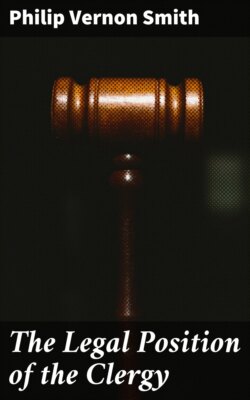Читать книгу The Legal Position of the Clergy - Philip Vernon Smith - Страница 27
На сайте Литреса книга снята с продажи.
Оглавление3. Every clerk in priest's orders, who has not relinquished the rights and privileges attaching to those orders under the Clerical Disabilities Act, 1870,[44] or become incapable of holding preferment under the Clergy Discipline Act, 1892,[45] is qualified to be appointed to a benefice. But, unless he has been so ordained by a bishop of the Church of England or of the Church of Ireland, or by a commissary of an English bishop under 15 & 16 Vict. c. 52, he is subject to the provisions of the Colonial Clergy Act, 1874,[46] or, if ordained in Scotland, of the Episcopal Church (Scotland) Act, 1864,[47] as to the previous consent or licence of the archbishop of the province or bishop of the diocese; and a clerk ordained priest as an alien or for service in the colonies under the Ordination of Aliens Act, 1784, or the Ordinations for Colonies Act, 1819, is subject to the same provisions.[48] The bishop may, however, independently of the Benefices Act, 1898, refuse to admit him on the ground of insufficient learning,[49] or of vicious conduct, heresy, or offences against ecclesiastical law in matters of ritual—anything, in short, which, if it occurred after admission, might be a ground for depriving him of the benefice.[50] And, under sect. 2 of that Act, the bishop may do so, (a) if at the date of the vacancy not more than a year has elapsed since a transfer within the purview of sect. 1[51] of the right of patronage of the benefice, unless the transfer is proved not to have been effected in view of the probability of a vacancy within the year; or (b) if not more than three years have elapsed since the presentee was ordained deacon; or (c) if the presentee is unfit owing to physical or mental infirmity, serious pecuniary embarrassment, grave misconduct, or neglect of duty in an ecclesiastical office, evil life, or scandal caused by his moral conduct since ordination; or (d) if he has, with reference to the presentation, been knowingly party or privy to a transaction or agreement invalid under the Act.[51] The 39th Canon lays down that a bishop shall not institute to a benefice a clergyman who has been ordained by another bishop, without production of his letters of orders and a sufficient testimony of his former good life and behaviour if the bishop requires it,[52] and his appearing on due examination to be worthy of his ministry. What this examination covers is not clearly definable; but it has not such a wide scope as the examination contemplated in Canon 48, which does not apply to presentees to livings.[53] Under the 95th Canon a bishop is allowed twenty-eight days for inquiry as to the fitness of a presentee; but this is merely directory, and he is not precluded from continuing the inquiry after their expiration.[54]
